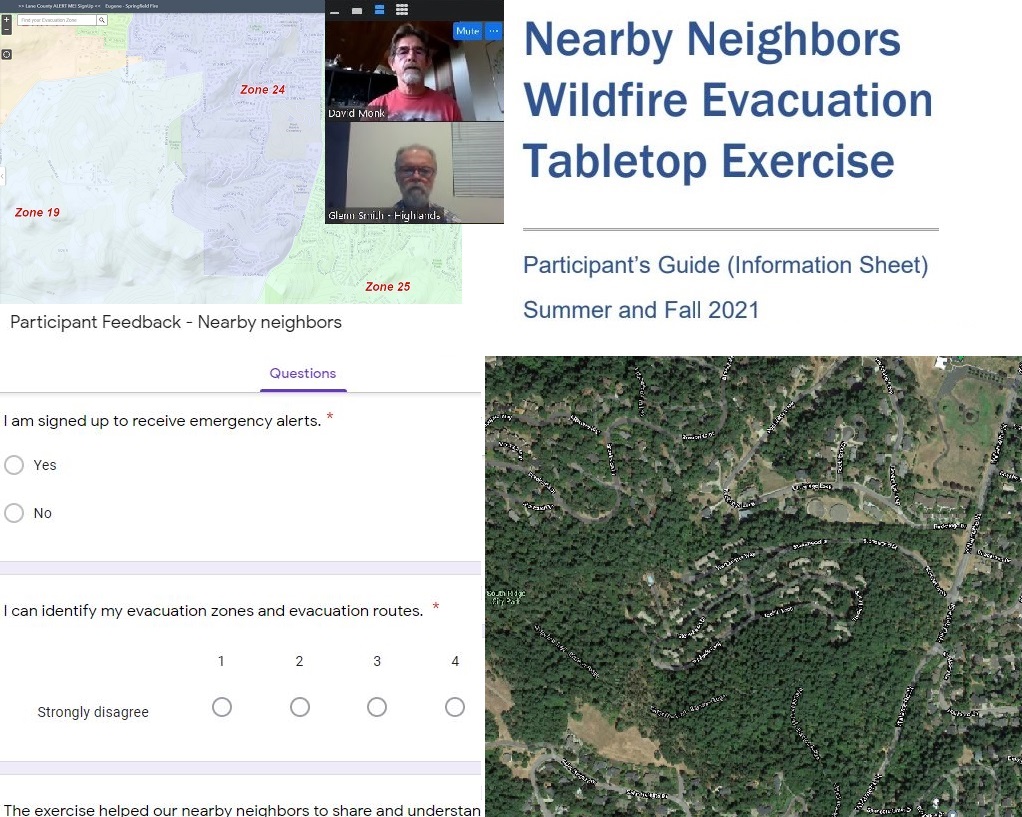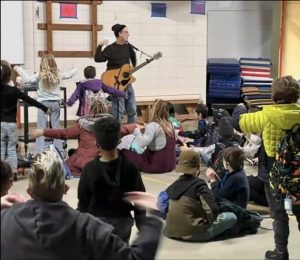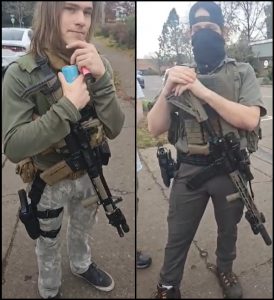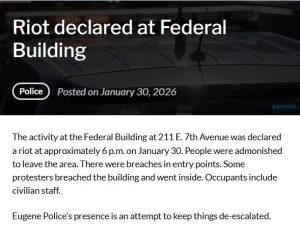‘Tabletop exercise’ helps nearby neighbors prep for evacuations
6 min read
Nearby neighbors participated in a simulated wildfire evacuation this week.
Eugene neighbors are preparing to help one another in case of wildfire.
[00:00:05] David Monk: You’ve taken care of yourself and your family first; now you’re out helping your neighbors. We briefly talked about having one or two people taking on some kind of responsibility for the nearby neighbors. And that’s really similar to the Block Captain concept we use in Map Your Neighborhood.
[00:00:25] John Q: Residents of the Highlands came together for a tabletop exercise this week.
[00:00:30] David Monk: The value of this exercise is for those of y’all living in Highlands to think about individually, whether you feel like you’re adequately prepared to help your neighbors and to organize with your neighbors, but also evacuate at a moment’s notice.
[00:00:49] John Q: David confirmed that everyone signed up for emergency alerts, and knows their zone.
[00:00:55] David Monk: If everybody isn’t already signed up for that text alert, we should really please do that, because that’s how the county or city are going to notify us, based on what zone we’re in, of whether we’re in level one, two or three. What zone are you in, Glenn? (24.) 24. Okay. So there you go. So, you know, you’re in 24. So should this happen in real time for us, you’ll be listening in for your specific zone.
[00:01:26] John Q: The facilitator then reads the exercise scenario.
[00:01:29] David Monk: And I’ll start by saying, this is an exercise. There’s high winds that have moved into the area. Firebrands from wildfire burning near Lowell are blown through the air across Dexter Lake and have ignited fires on both sides of Highway 58. And fire is moving northwest towards Pleasant Hill and Eugene. Smoke is limiting the visibility and speeds on the highway. As a result, there are multiple car accidents on Highway 58. Our exercise is starting with that background. And there’s a a media announcement identifying a red flag warning.
So, a question for you all: Given the situation, the scenario that I’ve outlined, what would you individually personally do in this situation?
Thank you for supporting
local civic journalism
[00:02:28] John Q: For the Highlands, Glenn Smith will put up red flags around the property.
[00:02:32] Glenn Smith: There, you got warning, the National Weather Service says you’ve got a red flag alert, we go put those flags up in front of all 16 of our buildings and we’ve already done it once. You know, I worry about cell phones, people not having their cell phone turned on. That’s why we’ve gone to this red flag system. People see it, they can’t miss it. We let people know, Hey, this is serious.
[00:02:54] David Monk: Excellent idea. You know, I spectated Topanga Canyon in Southern California. They did a simulated event like this and the level of redundancy in their alert systems—they use eight or nine different systems. And so I, I think what you’re suggesting is a really good idea, as many ways to alert neighbors as possible because not everybody has a cell phone, not everybody uses text.
[00:03:20] John Q: The group brainstormed about an alias for text messages, to share early warnings. Ellie Andrejko is one of the Highlands’ preparedness leaders.
[00:03:30] Ellie Andrejko: I just wrote a note that after this meeting, we need to get a message out to all of the residents to give them that Lane County text alert address. Some of them may have it, but maybe they don’t. And I hadn’t thought about that. So that’s something I think we need to do. So. It doesn’t take much to, there’s two of us in my building right now. We would just split the building up and knock on doors.
Glenn Smith: Yeah. That’s, that’s what I would do. I would run around and knock on everybody’s door in my unit.
Ellie Andrejko: And I have names and I just need to put them together. So we have 16 buildings and I still need three buildings I need contacts for. At least one and some have gone by themselves and gotten a second person to help them.
[00:04:13] John Q: David Hazen suggested another alert method.
[00:04:16] David Hazen: So on Amazon, for 15 bucks, you can buy a handheld air horn for marine use that can be heard for a half mile. And I think that would be a great redundant way of getting people to pay attention.
[00:04:34] David Monk: And so what you’re suggesting is, is a really good idea, as many ways to alert neighbors as possible because not everybody has a cell phone, not everybody uses text. So I think that’s a really good idea just to use your boards, use low-tech means. And then secondly, maybe finding out, what is your intention about when you would evacuate. So knowing what people’s intentions are beforehand, I think it would be really valuable.
[00:05:04] Ellie Andrejko: it just seems to me like if we gave people, uh, a cardboard card that they could stick on their door when they left, it would be a lot easier. And we’d know, we’d see that visual.
[00:05:18] David Monk: Great, great idea, Ellie. you know, that’s, um, the first responders to Map Your Neighbor, that’s what they recommend putting some sign on your front door, something that’s very visible. So that’s a really great idea. Again, it’s just as many ways as we can communicate this with one another.
[00:05:37] John Q: After alerts, the group discussed multiple evacuation routes.
[00:05:42] Glenn Smith: Well, we’re working on developing a hiking route out of here too, as David suggested, to the Sunset Hills Cemetery. It does need to be improved because it would be a little bit of a struggle for some of our older residents at the moment.
[00:06:03] Ron Bevirt (Southwest Hills Neighborhood Association): It might be useful to coordinate with some folks in Solar Heights to try to get a greater part of the neighborhood connected together.
[00:06:12] John Q: The exercise moved through level one, level two, and level three evacuation alerts. The scenario concludes with the survivors returning to find some homes destroyed.
[00:06:25] David Hazen: It seems appropriate to me that in the event of partial or mass destruction of a neighborhood that all the neighbors meet together, like out in the park, if there’s one available and have a community grieving ceremony of some sort to bring the people together as one group.
[00:06:50] John Q: The prospect of loss led to discussions about documenting insured items.
[00:06:55] David Monk: I know two Paradise survivors, one did that, and he and his family were made whole by State Farm Insurance, in this case. Another survivor, she is to this day, three years later, fighting with insurance companies over things she lost.
[00:07:11] David Hazen: It’s a good idea to go around your house either with the video or a still camera and take a picture of everything that’s on your shelves, your furniture, um, anything of value and put that on a portable hard drive.
[00:07:27] Ellie Andrejko: I just wrote myself a note, uh, that we need to give people some of these ideas that we’re talking about here, getting what’s really important to them ready to go and then taking pictures so that they can prove what they lost. And the other thing, to David’s point, when I took pictures, I also took pictures of the serial numbers on items.
[00:07:50] John Q: At the end, participants offer a quick evaluation.
[00:07:54] Ellie Andrejko: This is Ellie and I have four pages of notes here and my little symbol for action item. And I’ve got a lot of them here. I think we’ve done a lot and there’s a lot more that we can do, but thank you all for sharing.
[00:08:08] Glenn Smith: Yes. Thank you so much.
[00:08:09] Lisa Andrejko: I’ve learned a lot and I feel safer in this neighborhood. Um, I, and I’m glad I live in a community that’s so close and that we’re working together to help take care of each other.
[00:08:21] John Q: To participate in the tabletop, contact your neighborhood association.
David Hazen from the Shadow Wood neighbors recorded their tabletop exercise:




